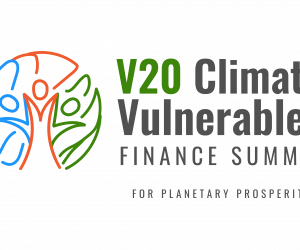Saima Wazed Hossain – UNGA Event 2020

Source: Climate Vulnerable Forum
H.E. Saima Wazed Hossain, Chairperson of the Bangladesh National Advisory Committee on Neurodevelopmental Disorders and Autism, and CVF Thematic Ambassador for Vulnerability
Climate Vulnerable Forum Leaders Event
October 7, 2020
Thank you Minister Momen,
Honorable chairperson, excellencies and distinguished participants, And to everyone watching our event,
- I am honored to be appointed as the CVF’s Thematic Ambassador for Vulnerability and help the forum to represent the needs of the most marginalized and vulnerable of the 1.2 billion people who are living in these countries suffering daily, living on the frontline of the global climate crisis. The realities of Climate change permeate their lives every day and in every aspect of their lives in the communities.
- From my perspective as a mental health expert and disability advocate, I am especially concerned about the “invisible injustice” of the mental health impact of individuals and families affected by disasters caused due to a changing climate.
- For instance, a single extreme cyclone, has been shown to increase the prevalence of mental health issues in the general population by 4%, whether they were directly impacted by the cyclone or not. And for those who are additionally vulnerable due to chronic physical or mental health conditions, living in extreme poverty, being dependent on others to help communicate their needs, those who cannot access relief assistance because of challenges in mobility, those who are marginalized because of their gender or sexual preferences and even those who are marginalized due to their religious and ethnic identities. The stakes are even higher for them. A single natural disaster can tailspin into a situation from which they may never be fully able to recover without the right kind of support mechanisms.
- We already know that the loss of home and income, loss of community and social support systems, disruption in daily life and continued insecurity due to unsafe and unsanitary living conditions and fears for daily needs and an uncertain future, can all have a compounding effect on mental health that can continue to remain with the individual even when things get better. More often than not, the greater the intensity of the loss, and the longer individuals continue to live with these uncertainties and fears, the more likely it is, that this one experience will lead to chronic anxiety, depression and conditions like post-traumatic stress disorders (PTSD). And If the Individual already has a propensity for Mental Health conditions, a manifestation or increased intensity of those conditions will occur. Ultimately preventing the individual from living a full productive balanced life, and becoming dependent on expensive health and social safety net programs, and Increasing the economic burdens on countries that can least afford them.
- Having said all that, I want us to also consider the actual experience of the most vulnerable communities, that are part of the CVF. And I want us to acknowledge and value the resilience, persistence and immense tenacity with which individuals from these communities continue to bounce back and thrive, despite those many challenges they face on a regular basis. The strength these most vulnerable groups demonstrate should be a guide to us, and we in fact, need to learn from them so that we may plan and prepare for a more resilient and empowered communities that can persevere and overcome hardships.
- In working to change the conversation on climate vulnerability, we should also open our minds to today’s youth and engage in constructive conversations with them for decisions we make ultimately will impact their future. The fresh ideas, new energy, and radical ambition of youth is urgently needed in all conversations on climate change. And programs like the Global Center on Adaptation’s Youth Adaptation Network are an excellent example of how it can be done.
- Therefore, in order to adequately address the needs of the climate vulnerable groups, I would like to suggest that the following agenda items of CVF be given priority:
- Expanding efforts to address health and climate change issues, and the impact of climate change on mental health and persons with disabilities,
- Supporting millions of people who are forced to flee their homes and even homelands because of a changing climate,
- Supporting billions of workers who struggle with rising heat in the workplace,
- And protecting the rights of the vulnerable everywhere, including through the CVF call for the creation of a dedicated UN Special Rapporteur for climate change and human rights.
Thank you.
Downloads
SHARE ON
Related News
12
Jul
Speech by H.E. Sheikh Hasina, Prime Minister Government of the People’s Republic of Bangladesh
Prime Minister
Government of the People’s Republic of Bangladesh
Speech by
H.E. Sheikh Hasina,
Prime Minister Govern...
12
Jul
H.E. Md. Shahab Uddin, MP, Minister of Environment, Forest and Climate Change, Bangladesh
Minister of Environment, Forest and Climate Change,
Bangladesh
H.E. Md. Shahab Uddin, MP,
Minister of Environment, Fo...
12
Jul
H.E. AHM Mustafa Kamal, Minister of Finance, Bangladesh and V20 Chair
Minister of Finance, Bangladesh and V20 Chair
H.E. AHM Mustafa Kamal,
Minister of Finance, Bangladesh and V20 Chair
...



